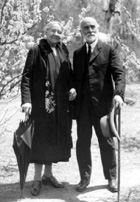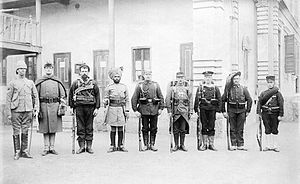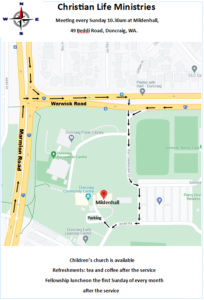Jonathon Goforth
Jonathan Goforth (1859 – 1936) was the first Canadian Presbyterian missionary to go to China with his wife, Rosalind (Bell-Smith) Goforth. Jonathan Goforth became the foremost missionary revivalist in early 20th century China and was primarily responsible for a great move of the Holy Spirit in the Protestant China missions.
Goforth grew up on an Oxford County, Ontario farm. As a young man he taught school in Thamesford, Ontario. He claimed to sense a call from God to go to China after hearing George Mackay, Presbyterian missionary to Taiwan, speak. He attended University of Toronto, and Knox College, where he graduated in 1887, and was awarded the Doctor of Divinity in 1915. Goforth met Rosalind Bell-Smith at the Toronto Union Mission during his training. She had been born in London, England, and had grown up in Montreal. They married in 1887, in his final year at Knox, and eventually had eleven children.
One book that had deeply impressed Goforth was China’s Spiritual Need and Claims, by Hudson Taylor. He ordered many copies of the book to promote missionary work in China and mailed them to many pastors that he knew.
China
 ChinaJonathon and his wife arrived in Shantung province in China in 1888. For two years the mission base was in Lingchin in Shantung. In 1890 they moved to Chuwang in Honan. In 1894 the mission moved to Changte. For the first seven years, Jonathon had been preaching in the field but with small results.
ChinaJonathon and his wife arrived in Shantung province in China in 1888. For two years the mission base was in Lingchin in Shantung. In 1890 they moved to Chuwang in Honan. In 1894 the mission moved to Changte. For the first seven years, Jonathon had been preaching in the field but with small results.
In 1900, the so-called Boxer Rebellion broke out. All foreigners in China were in great physical danger from Chinese infuriated by the years of insults and humiliation their nation had suffered from the West and Japan. In June, the missionaries in Changte received word from the American consul in Chefoo to flee south.
The Goforths had to flee for many miles across China during the Boxer Rebellion. Jonathan was attacked and injured with a sword, but they both survived and escaped to the safety of one of the “Treaty Ports”.
After many terrifying experiences and narrows escapes they reached Shanghai and sailed for Canada. The furlough was a time of sorrow for Goforth. In his tours around Canada, he found that worldliness had invaded the churches and many of the people had little concern for the unsaved masses in the heathen lands.
So back they went to China, to the multitudes they yearned to win to Christ. After their return to Henan in 1901, Goforth became restless and dissatisfied. It was at this time that an unknown party from England began sending pamphlets on the Welsh revival in 1904. Goforth was deeply stirred as he read these accounts.
A new thought, a new conception seemed to come to him of God the Holy Spirit. He had a strong desire to see a great move of the Spirit and many souls brought into the kingdom of God. He gave himself to much more prayer and study of the Bible.
 The Power of the Holy Spirit Came
The Power of the Holy Spirit Came
In 1908 he went to conduct some meetings in Manchuria. He began to meet daily with other missionaries to pray for the power of the Holy Spirit. These men vowed to God that they would pray until the power of the Spirit came. Goforth said:
My conviction is that divine power, so manifest in the church at Pentecost, was nothing more or less than what should be in evidence in the church today. Normal Christianity, as is planned by our Lord, was not supposed to begin in the Spirit and continue in the flesh. In the building of His temple it never was by might nor by power, but always by His Spirit.
The Lord Himself met the foiled Satan after first being filled with the Spirit. And no child of God has ever been victorious over the adversary, unless empowered from the same source. Our Lord did not permit His chosen followers to witness a word in His name until endued with power from on high. It is true that before that day they were “born again” children of the Father and had the witness of the Spirit. But they were not the Lord’s efficient co-workers and never could be until Spirit-filled. This Divine empowering is for us as for them. We, too, may do the works our Lord did, yea and greater works.
The scriptures convey no other meaning to me than that the Lord Jesus planned that the Holy Spirit should continue amongst us in as mighty manifestation as at Pentecost. One should be able to chase a thousand and two put ten thousand to flight — as of old. Time has not changed the fact that “Jesus Christ is the same yesterday, today and forever.”
“But will it last?” How constantly unbelief puts this question! Of course, the work will last — if man is faithful. When the blood-bought servants of Christ yield Him absolute dominion, all the resources of the Godhead are in active operation for the glory of the Lamb which was slain. The efficacy of the baptism of the Holy Ghost and of fire dies down in any soul only when that soul wilfully quenches it. Did Pentecost last? Did God will that it shouldn’t? Pentecost was of God. So was the Wesleyan Revival. It is not of God, then, but man whom we must blame for the pitiful way in which the channels of blessing, originating in these great movements, have become clogged up.
We cannot emphasize too strongly that all hindrance in the church is due to sin ….. the Holy Spirit brings all manner of sin to light. Indeed, the appalling fact is that every sin which is found outside the church is also found, although perhaps to a lesser degree, within the church. For fear that some may judge too harshly, we would point out that many of these Chinese churches, of which mention is made are not even one generation removed from heathenism. At the same time, let us not delude ourselves by thinking that all is well with our old established churches at home. It is sin in individual church members, whether at home or on the foreign field, which grieves and quenches the Holy Spirit. I imagine that we would lose much of our self-righteousness if we were to find that pride, jealousy, bad temper, back-biting, greed and all their kindred are just as heinous in God’s sight as the so called grosser sins. All sin in the believer, of whatever kind, mars the redemptive work of Christ.
If revival is being withheld it is because some idol still remains enthroned.
The most piercing cries that I have ever heard have come from Chinese Christians, when the Holy Spirit made plain to them that their sin had crucified the Son of God afresh.
“Behold, the Lord’s hand is not shortened that He cannot save; neither is His ear heavy, that He cannot hear: But your iniquities have separated between you and your God, and your sins have hid His face from you, that He will not hear.” [Isaiah 59:1,2]
The filth and blood-guiltiness of the churches can only be swept away by the Spirit of Judgment and of burning.
Some years ago, while addressing a large body of ministers and elders in the homeland, we urged that the Divine call was for a greater emphasis upon sin. A few hours later, at a certain ministerial gathering, the subject was brought up, and I understand that in the argument that ensued a large majority decided that the church had laid too much emphasis upon sin. Man’s thoughts, however, are not God’s thoughts. Calvary is His emphasis upon sin. Surely, since the sinless Son of God had to be made sin for us an over-emphasis upon sin is in the nature of things impossible. Wasn’t John Wesley, who, as he was passing in the presence of the King, was heard whispering:
“I the chief of sinners am, but Jesus died for me!”
Acknowledgements: References.








